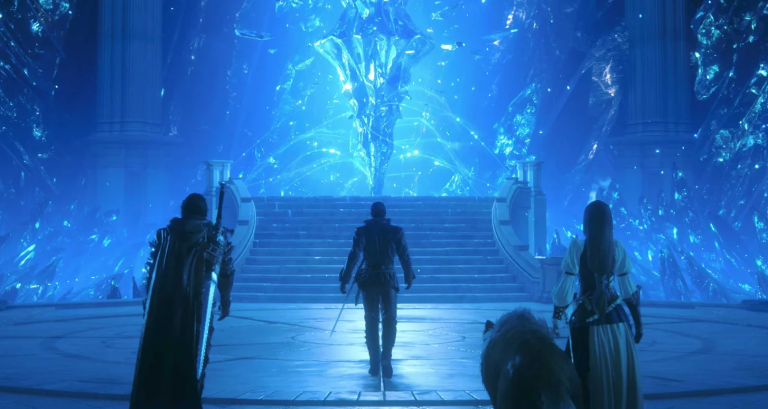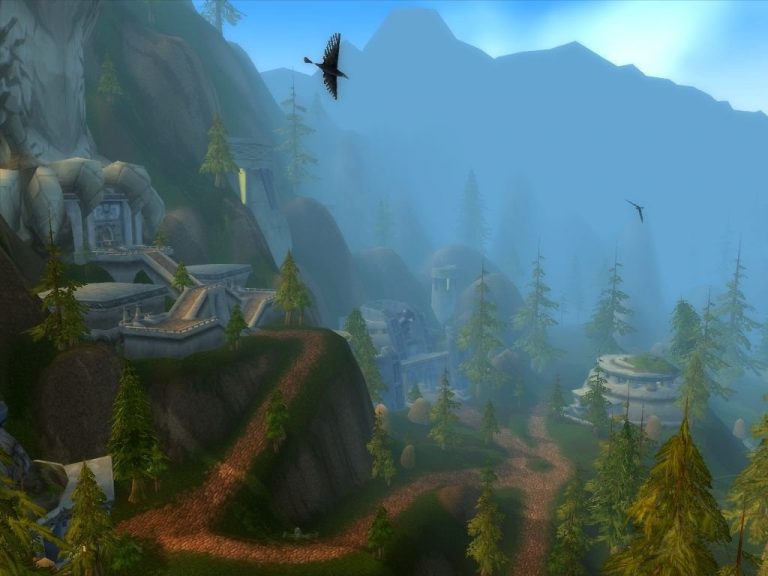The Enchanted World of RPG Games
Role-Playing Games, commonly known as RPGs, transport players into immersive, fantastical worlds where they assume the roles of fictional characters, embarking on epic adventures. The appeal of RPGs lies in their capacity for escapism and storytelling. Players make choices that affect the game’s outcome, shaping their characters’ development, personalities, and interactions with the game’s universe. The rich narratives, character customization, and the freedom to craft one’s destiny draw gamers in. Whether it’s wielding a sword in a medieval fantasy realm or navigating the intricate social web of a futuristic dystopia, RPGs provide a unique blend of agency and storytelling, making them a cherished genre among gamers.
The History of RPG Games
The realm of Role-Playing Games (RPGs) is like a time-traveling journey through the evolution of gaming fun. RPGs have come a long way, from their early days when imagination reigned supreme to becoming one of the most cherished game genres.
Our adventure begins in the quaint era of tabletop gaming, where players gathered around with character sheets and dice to embark on epic quests. “Dungeons & Dragons,” the iconic game born in 1974, was a pioneer in shaping the RPG world. It let players become wizards, warriors, or rogue-like rogues, all while exploring meticulously crafted fantasy realms. This was the spark that ignited the RPG flame, focusing on character development, storytelling, and player choices.
At the same time, the computer age was dawning. Text-based RPGs became all the rage. These early computer adventures, like “Adventure” (or Colossal Cave Adventure), combined storytelling with a minimalist graphic approach. Gamers typed in commands to navigate through fantastical adventures. Despite the lack of high-res graphics, these games laid the foundation for the interactive storytelling that RPGs would become known for.
Then came the ’80s, and with them, video game RPGs. The marriage of storytelling from tabletop games and the visual allure of digital graphics was a match made in gaming heaven. Titles like “Ultima” and “Wizardry” led the way, introducing players to pixelated worlds and turn-based combat.
But the real game-changer arrived in the form of “Dragon Quest” in 1986, followed closely by “Final Fantasy” in 1987. These Japanese RPGs (JRPGs) wowed gamers with their compelling stories, memorable characters, and turn-based combat mechanics. They rocketed RPGs to international fame, captivating players with their rich narratives and immersive gameplay.
So, the history of RPGs is not just a tale of adventure; it’s a story of innovation, persistence, and captivating fun. These games have not only preserved the tradition of storytelling and character development but have also pushed the boundaries of technology, delivering thrilling experiences that continue to captivate gamers worldwide. Let the RPG adventure continue!
Console RPG Games
Console RPGs have played a significant role in shaping the landscape of the gaming industry. The evolution of Role-Playing Games on various gaming consoles, including Nintendo, Sega, PlayStation, and Xbox, has been nothing short of remarkable.
Nintendo: Nintendo has been a pioneering force in the RPG realm, with titles like “The Legend of Zelda.” The series, launched in 1986, introduced players to the mythical land of Hyrule and the heroic Link. It combined action and puzzle-solving elements, defining the action RPG sub-genre. Meanwhile, “Pokemon,” with its pocket monsters, became a cultural phenomenon, bridging the gap between RPGs and collecting games.

Sega: Sega’s contributions to RPG gaming include the “Phantasy Star” series, with its sci-fi and fantasy blend, captivating players with its space-faring adventures. “Shining Force” also made its mark, offering strategic, turn-based combat and a captivating storyline. Sega’s RPGs appealed to a different audience with their unique settings and gameplay.
PlayStation: Sony’s PlayStation platform introduced iconic RPGs like “Final Fantasy.” This series, originating on the NES, truly blossomed on the PlayStation, particularly with “Final Fantasy VII.” Its cinematic storytelling and immersive world-building set new standards for the genre. Additionally, the “Suikoden” series and “Chrono Cross” offered engaging narratives and memorable characters, further solidifying PlayStation’s place in RPG history.
Xbox: The Xbox platform made waves with “The Elder Scrolls III: Morrowind” and “Fable.” “Morrowind” provided a massive, open-world experience with an unprecedented degree of player freedom. “Fable,” on the other hand, introduced players to a world where choices impacted character development and the game’s outcome.
These iconic RPGs, representing different eras and gaming consoles, underscore the diverse and enduring appeal of the genre. Console RPGs have continued to evolve and adapt, offering players a variety of experiences, from fantasy adventures to spacefaring epics, cementing their place in gaming history.
PC RPG Games
PC RPGs have long been the cornerstone of the role-playing game genre, establishing their significance in the gaming world. They’ve paved the way for innovation and storytelling and have influenced the broader gaming industry in profound ways.
The importance of RPGs on personal computers cannot be overstated. PCs provide a versatile platform for developers to create expansive worlds, intricate narratives, and intricate character progression systems. Players on PC have relished the ability to mod, customize, and explore the limitless possibilities that the platform offers. Titles like “Baldur’s Gate,” released in 1998, exemplify this; its isometric view, deep character development, and complex storylines set new standards for PC RPGs.
“Ultima,” a series that spans multiple decades, is another classic. It brought open-world exploration and morality-based decisions into the RPG sphere. Ultima’s influence is still felt in modern RPGs, particularly those that focus on player choices and their consequences.
PC RPGs have influenced the gaming industry in multiple ways. They championed the importance of player agency and the significance of storytelling in games. The concept of an open world, where players could explore and affect the outcome of the story, was nurtured in PC RPGs. Additionally, the modding community, driven by PC gamers, has contributed to the longevity and innovation of RPG titles. It’s not uncommon for PC RPGs to receive fan-made content and expansions that breathe new life into older games.
PC RPGs have been instrumental in shaping the gaming landscape, inspiring developers and players alike. Their legacy is evident in the growing trend of player-driven narratives and the thriving modding communities found in many RPG titles today.
The Emergence of MMORPGs
The gaming world was forever altered with the advent of Massively Multiplayer Online Role-Playing Games (MMORPGs). These virtual worlds offered an unprecedented level of interaction and immersion, redefining the gaming landscape.
The rise of MMORPGs can be attributed to several factors. Advances in internet connectivity made it possible for large numbers of players to inhabit a single online universe simultaneously. Games like “EverQuest” and “Ultima Online” in the late ’90s paved the way for the MMORPG genre, offering players the chance to create characters, embark on quests, and interact with thousands of other players worldwide.
However, it was “World of Warcraft” (WoW), released in 2004, that truly revolutionized the genre. WoW’s meticulously crafted universe, extensive questlines, and accessible gameplay drew millions of players into the world of Azeroth. It became a cultural phenomenon and set the gold standard for MMORPGs.
The impact of MMORPGs on the gaming landscape cannot be overstated. They shifted the focus from solitary gaming experiences to social, collaborative play. The concept of raiding, where groups of players tackle challenging content together, became a hallmark of MMORPGs. These games also introduced in-game economies, player-driven narratives, and virtual societies, where players could forge friendships, rivalries, and even economies. In essence, MMORPGs transformed gaming into a dynamic, communal, and persistent experience, shaping the way we play and interact in virtual worlds.
Japanese RPGs (JRPGs)
Japanese RPGs (JRPGs) have left an indelible mark on the gaming world, enchanting players with their captivating stories, unique gameplay mechanics, and global appeal. Titles like “Final Fantasy,” “Dragon Quest,” and “Persona” have garnered widespread popularity.
“Final Fantasy” stands as a shining exemplar, renowned for its intricate narratives, rich character development, and stunning visuals. It seamlessly blends fantasy and science fiction, offering players a vast, immersive world to explore. “Dragon Quest” brings forth a more traditional RPG experience with its charming, fairytale-like adventures, emphasizing turn-based combat and endearing characters.
The hallmark of JRPGs is their turn-based combat system, allowing for strategic battles that hinge on timing, character abilities, and teamwork. This tactical approach has influenced numerous RPGs across the globe.
The global appeal of JRPGs transcends language and culture. Their compelling storytelling and relatable characters resonate with players worldwide. Japanese RPGs have not only brought us epic adventures but also a sense of connection and shared experiences that knows no boundaries, making them a cherished genre in the global gaming community.
Western RPGs
Western RPGs (WRPGs) have made their mark with epic narratives, complex characters, and the ability for players to shape their own destinies. Titles like “The Witcher” and “Mass Effect” have been pivotal in this regard.
“The Witcher” series, based on Andrzej Sapkowski’s novels, introduces players to Geralt of Rivia, a monster hunter navigating a morally gray world. The choices players make influence not only the storyline but also the fate of the game’s characters. It’s a remarkable example of how WRPGs empower players to make consequential choices and shape the story.
“Mass Effect” combines thrilling sci-fi with character-driven storytelling. Players take on the role of Commander Shepard, influencing the fate of the galaxy through their choices. This series exemplifies the dynamic nature of WRPGs, where the choices made in one game carry over to the next, offering a truly personalized experience.
Western RPGs often feature open-world settings that invite exploration. Games like “The Elder Scrolls” series and “Fallout” epitomize this aspect. The expansive worlds are filled with quests, secrets, and the freedom to approach the story as the player sees fit. This open-world approach allows for multiple playthroughs and fosters a sense of player agency.
Indie RPGs
Indie RPGs have surged in popularity, demonstrating that even smaller studios can create impactful and imaginative experiences. Titles like “Undertale,” “Stardew Valley,” and “Hollow Knight” have played a significant role in this indie RPG renaissance.
“Undertale” is celebrated for its innovative take on player choice. It allows players to decide whether to spare or battle enemies, affecting the story and character interactions. This subversion of traditional RPG mechanics captivated players and showcased the potential of indie RPGs.
“Stardew Valley” is a farming simulation RPG that invites players to build a new life in a rural town. Its charming simplicity, deep gameplay mechanics, and emotional connections with the in-game characters resonated with players, demonstrating the power of indie RPGs to evoke a sense of nostalgia and heartfelt experiences.
“Hollow Knight” is an atmospheric, metroidvania-style RPG known for its intricate world design, challenging combat, and hauntingly beautiful art. It emphasizes exploration and discovery, a hallmark of many indie RPGs that value player-driven storytelling.
The Influence of RPGs on Popular Culture
RPGs have extended their influence beyond the gaming world. They have permeated literature, movies, and various forms of media, fostering a vibrant community and fanbase.
RPGs have influenced the fantasy genre in literature, with authors like George R.R. Martin drawing inspiration from RPG storytelling elements. Movies such as “The Lord of the Rings” and “Harry Potter” showcase the impact of RPG world-building on cinematic storytelling.
Moreover, the RPG community is a diverse and passionate one, creating fan fiction, fan art, and fan conventions. The camaraderie among RPG enthusiasts has birthed communities that celebrate the genre, further solidifying its cultural significance.
The Future of RPG Games
The future of RPG games promises to be as exciting as their history. Emerging technologies like virtual reality (VR) and augmented reality (AR) hold the potential to transform RPG experiences. VR RPGs could immerse players even further into the game world, making the role-playing experience even more lifelike. AR RPGs could overlay digital elements onto the real world, creating unique and interactive experiences.
Additionally, the gaming industry continues to evolve with new platforms and technologies. The advent of cloud gaming services and cross-platform play will shape the way players experience RPGs. Whether on a console, PC, mobile device, or a cloud-based platform, the RPG genre is set to reach new heights of accessibility and innovation.
The world of RPGs is a dynamic and ever-expanding realm, driven by the successes of Western and indie RPGs, influential on popular culture, and poised for exciting developments in the future. RPG enthusiasts can look forward to continuing adventures that captivate the imagination and offer endless opportunities for storytelling and exploration.
Conclusion
In the enchanting world of RPG games, we’ve embarked on an epic journey through the realms of imagination, storytelling, and unparalleled gameplay. We’ve witnessed the genesis of RPGs from their humble beginnings in tabletop games and text-based adventures to their evolution into captivating video game experiences. We’ve explored the diverse landscape of RPGs across different gaming consoles, PCs, and the rise of Massively Multiplayer Online Role-Playing Games (MMORPGs), setting new standards in the gaming realm.
We’ve marveled at the global impact of Japanese RPGs (JRPGs) and the player-driven narratives of Western RPGs. The rise of indie RPGs has proven that even smaller studios can create magnificent gaming experiences. RPGs have woven their influence into literature, movies, and popular culture, fostering vibrant communities of enthusiasts.
As we gaze toward the future, we see a realm of infinite possibilities, with virtual reality and augmented reality poised to redefine RPG experiences. The allure of RPG games remains timeless, and we encourage you to delve into this captivating world, where stories come to life, and adventures are limited only by your imagination. In the ever-expanding universe of RPGs, the next epic quest awaits, and the choice of where to venture next is yours.






